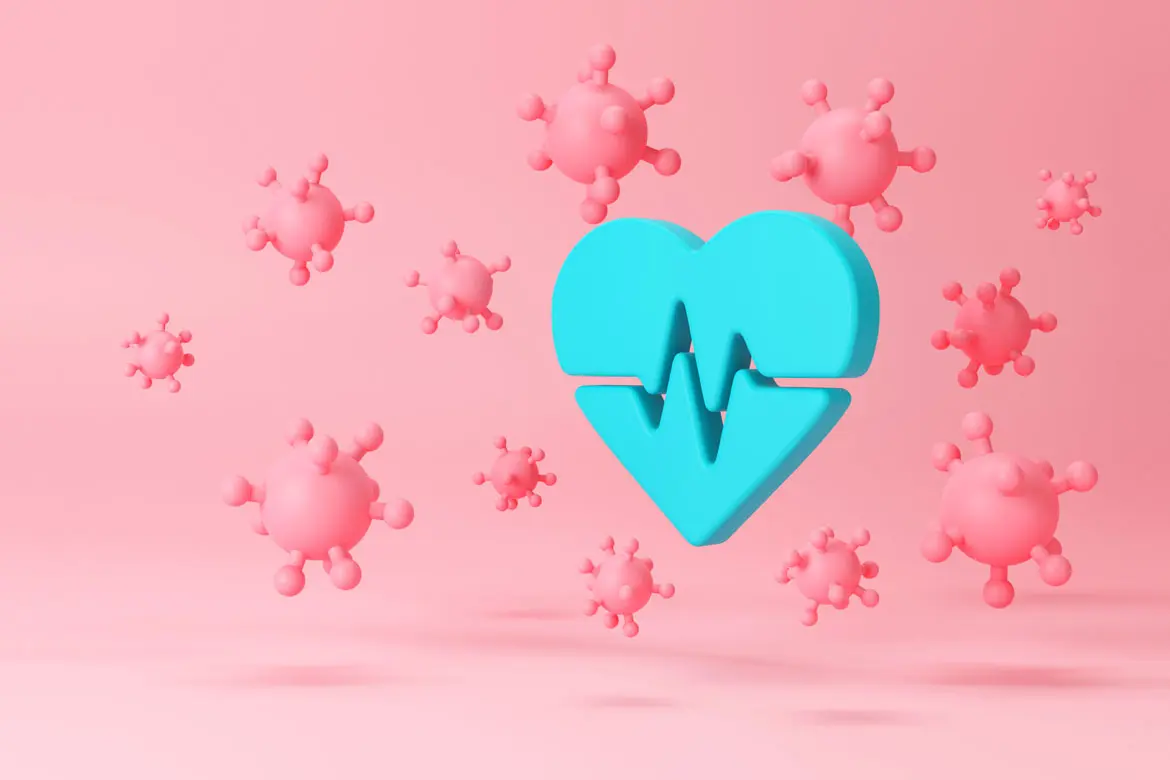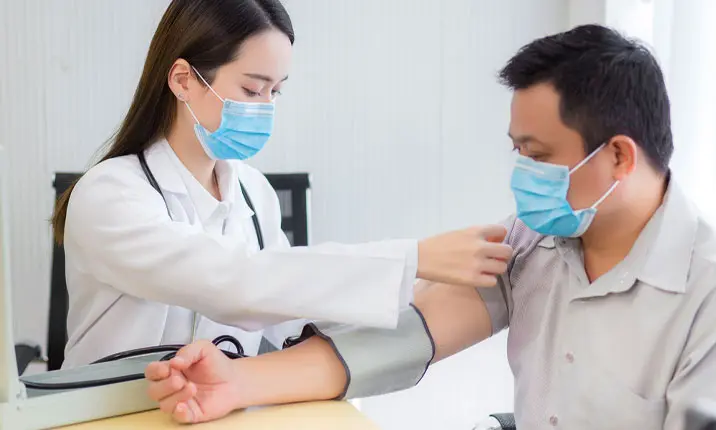With a vast majority of her population vaccinated against COVID-19, Singapore is gradually transitioning to living with the COVID-19 virus. It's a 'new normal' where COVID-19 is treated as an endemic condition, not unlike the seasonal flu, but it is not one without risk, especially to those with pre-existing medical conditions.
Dr Reginald Liew, cardiologist at Mount Elizabeth Hospitals details how the disease may affect patients with underlying heart disease, and what can be done to manage the risks.
How does COVID-19 affect patients with pre-existing heart disease?
COVID-19, the disease caused by the SARS-CoV-2 coronavirus, can affect the heart muscle and blood vessels, resulting in several distinct problems including heart attack, stroke, heart failure, heart inflammation, heart rhythm disorders (arrhythmias) and blood clots.
Patients with pre-existing heart disease are at greater risk of developing a serious heart problem and may have a poorer outcome should they contract COVID-19, as their heart muscle function may already be weak or damaged. Any pre-existing blood vessel blockage could also lead to a sudden heart attack triggered by the infection and inflammation.
Additionally, many patients with pre-existing heart disease also have high blood pressure. Studies have found that the effect of COVID-19 infections in patients with hypertension tend to be more severe and the death rates higher compared to those without hypertension.
Patients with pre-existing heart disease may also experience a worsening of their symptoms, such as chest discomfort, palpitations and breathlessness if they were to contract COVID-19, as well as require more intensive treatment in hospital with a higher risk of a serious illness and even death.
How dangerous will it be for them to contract COVID-19?
Patients with COVID-19 who tend to do better and have milder forms of the disease are typically younger individuals who are fit and healthy and do not have any chronic medical conditions. Unfortunately, heart disease patients tender to be older and have multiple medical problems, including hypertension, diabetes, obesity, and kidney disease, all of which place them at higher risk.
They may also have weakened heart muscle function or pre-existing vascular diseases and a reduced physical ability to fight off the infection and overcome the complications that may result from infection. All these make it more dangerous for heart disease patients should they contract COVID-19.
Are there specific heart conditions that would put patients at greater risk?
Patients with hypertension, heart failure, heart muscle diseases, coronary artery disease (presence of underlying atheroma or plaque in the blood vessels of their heart) and congenital cyanotic heart disease tend to be at greater risk if they contract COVID-19.
How does being vaccinated help ease the risk?
Getting the COVID-19 vaccine significantly reduces one's chances of having a poorer medical outcome, including severe disease, hospitalisation and death, as well as requiring intensive care if one were to catch the infection.
Vaccinated individuals will be able to develop an immunity that usually results in a milder form of the infection. Also, some data suggests that transmissibility of the SARS-CoV-2 coronavirus may be reduced in vaccinated persons, although further studies are needed to confirm this.
What are your thoughts on the safety of COVID-19 vaccines for patients with a heart condition?
I strongly recommend patients with heart disease, including those with risk factors such as diabetes and hypertension, to take the COVID-19 vaccine as they are at increased risk of having a poorer outcome (including needing intensive care or dying) if they were to catch the virus.
Some people experience minor side effects from the vaccine, such as low-grade fever, pain and redness over the injection site, fatigue, muscle aches and headaches. However, these are usually short- lived and resolve within a few days. There is no evidence suggesting that heart disease patients are at increased risk of side effects from the vaccine compared with other people.
The rare cases of heart inflammation (myocarditis and pericarditis) reported with the mRNA COVID-19 vaccines tended to occur in younger individuals (mostly males below the age of 30 years) with no pre-existing heart disease.
What are some warning signs that patients with heart problems should look out for?
Patients should look out for a worsening of their usual symptoms such as increased heart rates or palpitations, breathlessness, chest discomfort, increased tiredness and fatigue, if they were to catch COVID-19.
Sometimes patients may develop new symptoms that they may not have experienced before which may also be dangerous and require prompt medical attention.
For example, COVID-19 can increase the risk of developing blood clots in the legs which can dislodge and travel to the lung blood vessels causing chest pain, sudden shortness of breath or collapse. Therefore, patients who notice a swelling in their legs (especially if on one side) or sudden difficulty breathing should see a doctor urgently. They may also notice a decrease in their oxygen level from their pulse oximeter (any readings below 92% is considered severe) as this can be a sign of worsening lung function, fluid in their lungs or a lung blood clot and should also prompt urgent medical attention.
How can patients manage their conditions, especially in these 'riskier' times?
It is important that patients with heart disease continue to take their usual medication as prescribed by their doctor and seek prompt medical attention should they develop any worsening of their cardiac symptoms or new symptoms.
Staying as healthy as possible, including eating healthily, exercising regularly, drinking plenty of fluid and sleeping well as well as reducing stress factors can reduce the risk of an adverse outcome if they were to catch COVID-19. Of course, it would be best to avoid catching COVID-19 in the first place, so taking precautions such as avoiding crowded places, wearing face masks and social distancing, especially among older patients who are at greater risk, remains important.
How important is it for patients to regularly attend checkups/screenings for their heart?
It is very important that patients continue to see their doctors regularly for their usual check-ups and try not to miss any scheduled appointments as the doctor may detect a worsening of their heart condition and make changes to their medication or treatment, which can reduce their risks. They should see a doctor earlier if they notice new, or worsening, symptoms.
If patients are unable to visit their doctors in person or are concerned about visiting a hospital or clinic during these times, they can check with their doctors if they provide tele-consultation serves. Their doctors can then decide if this is suitable or if the patient still needs an in-clinic visit.
What tips can you share for your patients as COVID-19 becomes endemic in Singapore?
As COVID-19 becomes endemic in Singapore and the world, those most at risk, including the elderly and people with pre-existing heart conditions, should continue to stay alert and take precautions to reduce their chances of catching the infection. Those who are suitable to take the COVID-19 vaccine should also do so to reduce their chances of having a poorer outcome if they were to catch the infection.
My tips include the following:
- Try to avoid going out if possible, especially when COVID-19 cases in the community are high. If you need to go out, try to avoid crowded places, wear a mask and maintain social distancing (at least 1 metre from others).
- Maintain good hygiene, such as regularly cleaning your hands with alcohol-based hand rub or soap and water. Avoid touching your eyes and mouth, especially when out in public.
- Clean and disinfect surfaces frequently, especially those which are regularly touched, such as door handles and phone screens.
- Stay as healthy as possible by eating healthily, resting adequately and exercising regularly.
- Continue to follow-up with your doctor at the recommended visit intervals and take your prescribed medication.
- Take the COVID-19 vaccine and follow-up doses when advised to do so and consider getting a flu vaccine to protect against other viral infections.
- Be aware of the symptoms that can occur if one catches COVID-19 and seek prompt medical attention if one develops those symptoms.















